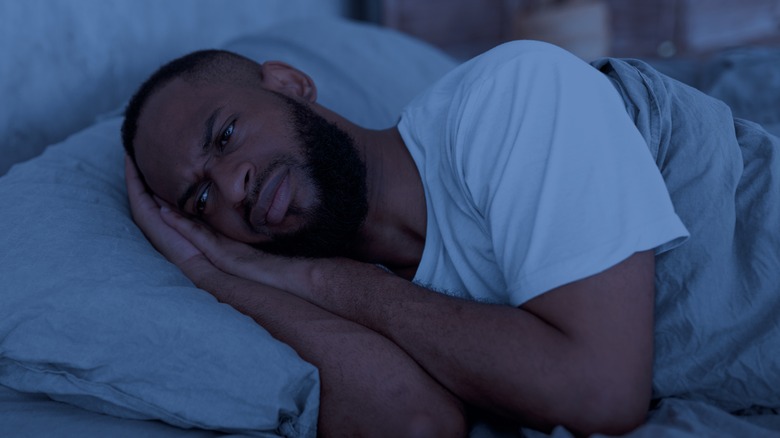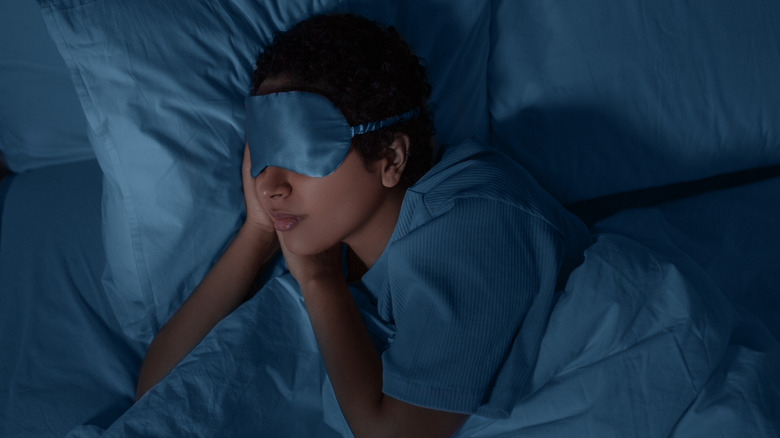How To Combat Insomnia Caused By Taking Wellbutrin
For those who experience major depressive disorder (MDD) or seasonal affective disorder (SAD), the antidepressant medication bupropion may be an effective treatment method to help patients manage depression symptoms on a daily basis, according to the National Alliance on Mental Illness (NAMI).
Bupropion, which goes by the brand name Wellbutrin, comes in a variety of forms and dosage amounts designed to help correct chemical imbalances of neurotransmitters within the brain (via WebMD). Over the years, prescription numbers for bupropion have grown, with nearly 29 million prescriptions issued in 2020 (per Statista).
Within the first week or two of usage, those taking bupropion may see positive changes in regards to their appetite or energy levels (via NAMI). Approximately six to eight weeks into treatment, individuals may then notice marked improvement in their mood. While Wellbutrin may have the potential to boost quality of life for certain people living with symptoms of depression, the drug can also produce some challenging side effects for patients.
Wellbutrin can increase alertness
Dry mouth, headache, nausea, dizziness, rapid heart beat, and constipation are among some of the more commonly experienced side effects associated with bupropion (via NAMI). Additionally, it is also not uncommon to experience insomnia in relation to bupropion usage. In fact, research from 2005 published in The Primary Care Companion to the Journal of Clinical Psychiatry found that between 11% and 20% of bupropion users experienced insomnia. While not a stimulant in and of itself, the drug can boost dopamine and norepinephrine levels in the brain, leading to increased feelings of alertness (via The Primary Care Companion).
In the event that you or a loved one experiences insomnia as a result of taking bupropion, it's important to speak to your doctor, as adjustments to the dosage or type of medication may be needed. In addition, there are also at-home remedies you can implement that may help you to improve your sleep quality even if you stay on the medication.
Treatment adjustments and nighttime habits
Those who take a short-acting version of bupropion later in the day are often more prone to insomnia come bedtime (via The Primary Care Companion). To help combat these sleep difficulties, first try speaking with your healthcare provider about potentially altering your treatment regimen. Patients who use a longer-acting form of the drug that's taken in the morning rather than in the afternoon often find that its alerting effects have dissipated by the time they're ready for sleep (via SingleCare).
A second way to help combat insomnia related to bupropion usage is to develop positive sleep habits. Sticking to a set bedtime, setting a cool room temperature at night, and eliminating all light, noise, and distraction before bed can all boost one's quality of sleep throughout the night.
However, in addition to setting yourself up for success at night, you can also set yourself up for a fruitful night of sleep during the daytime too.
Daytime habits and supplementation
Implementing helpful daytime habits to support sleep come nighttime can also help keep insomnia at bay. This includes refraining from drinking caffeinated beverages like coffee or energy drinks in the afternoon, as well as striving to get regular exercise earlier in the day.
Lastly, some people swear by certain supplements, such as melatonin, as a helpful sleep aid for fighting off insomnia. While there have been no reported drug interactions between melatonin and Wellbutrin, it's critical to talk to your doctor before you add anything new to your regimen (via Drugs.com). Bupropion can interact with various supplements, vitamins, herbs, and more (via Medical News Today). Therefore, it's always best to be honest with your doctor before taking any supplements so they can help determine whether combining supplementation and antidepressants is a safe and healthy option for each patient's individual needs.
If you or someone you know needs help with mental health, please contact the Crisis Text Line by texting HOME to 741741, call the National Alliance on Mental Illness helpline at 1-800-950-NAMI (6264), or visit the National Institute of Mental Health website.



